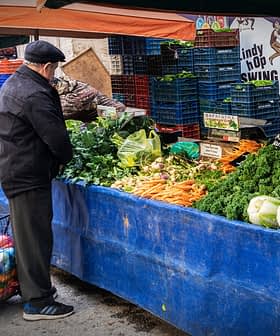Lower Volumes Forecast As Harvest in Greece Hits Its Stride
A reduction in quality and quantity is expected In the majority of olive oil making territories compared to last year
With the harvesting season underway in Greece, Greek olive oil production is expected to be significantly lower than the previous season. Some early estimations have calculated it at around 240,000 tons, down by more than 30 percent compared to the 350,000 tons of olive oil came out of the mills last year.
The fruit fly invasion and other pathogens like the gloeosporium that attacked the olives this year, combined with the fact that this is an ‘off’ season for many areas due to the production cycle of olive trees, will ultimately lead to less olive oil produced in the country.
In Crete, only the areas of Kolymvavi and Apokoronas near Chania are set for a good production, with other areas like the usually bountiful territories of Heraklion and Lasithi suffering a big loss.
“We anticipate a strong production, bigger than last year,” Nektarios Paraschakis of the Agricultural Association of Chania to Olive Oil Times. “The rest of Crete has really a problematic season with low quantities and in advance, many producers have issues with the quality of their oil due to the fruit fly and other diseases, but our area is unaffected. We get acidities of 0.3 to 0.4 for our extra virgin, meaning that it will be of high quality.”
Last season’s olive oil yield of the region of Chania came in at about 22,000 tons.
Other areas are also expected to have a reduced production, like Lakonia where last year’s 25,000 tons are expected to be diminished by 50 to 60 percent this season, and the Ilia region in west Peloponnese where the harvest will be only 13,000 to 15,000 tons of more than 30,000 tons usually made there.
The island of Lesvos gave more than 12,000 tons of quality olive oil last year, but now things are worse than ever with most of the production already lost due to the weather ups and downs and the fruit fly catastrophe.
In other olive oil-making territories like Chalkidiki, Aetolia-Acarnania, and Thasos island, big reductions in quantities are also expected.
Amid the unpromising crop, an encouraging sign for producers in various areas of the country is that the acidity levels have started to improve, as the first loads of fruit infected by flies have been processed and the newly harvested olive fruits are in better shape.
In the areas of Messinia and Lakonia, some producers are delighted to see acidities of 0.4 to 0.5 compared to 0.7 or 0.8 before, meaning that they are getting better extra virgin oil that will sell for a higher price.
And due to the scarcity of extra virgin olive oil this season, a never-seen-before practice of Greek producers is to sell for different prices according to the level of acidity of their extra virgins, getting higher prices for lower acidity levels.
Trying to tackle the fruit fly problem, and with producers from all over the country protesting about the late and insufficient measures applied each year, the Ministry of Agriculture promised that it will opt for better management and coordination of local authorities and will provide the necessary funding sooner than in previous years.
Some experts of the olive oil industry have calculated the total loss for growers and producers somewhere between €300 to €500 million ($340 to $567 million) for this season, not including the loss of others in the production chain like bottlers and exporters.
They also noted that due to the reduced volumes of olive oil coming from Italy and Greece, Spain is expected to make almost half of the world’s olive oil this season and they will set the prices for extra virgin and virgin olive oil for the global industry.









